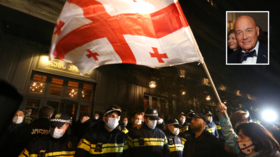Despite millions of dollars & NATO/EU promises, Western powers are finding out that Georgia is a tricky place to play politics

The Caucasus nation of Georgia is making its Western sponsors unhappy again. The ruling party, Georgian Dream, has ditched a pact designed to soothe tensions in a fiery internal political dispute which spilled over into violence.
Known as the April 19 Agreement, it was signed this spring as a compromise deal between the government and opposition factions, and sponsored by both the US and EU. Implementing it required a finely balanced sequence of electoral, legal and judicial steps.
Announcing its end, Georgian Dream claimed that the agreement’s main provisions have already been realized. That, unfortunately, is nonsense. In reality, the deal has never actually worked well. Its failure is due partly to authorities disregarding the spirit of the pact, notably in its judicial appointments policy, and partly to the most powerful opposition forces, most of all the United National Movement (UNM), failing to sign up to it, both literally and metaphorically.
While many factors have sabotaged the deal, it is the government which has finally pulled the plug on it, and most – although not all – Western sponsors, with some mild gesturing toward the opposition clearly for appearances’ sake, place the blame squarely on Georgian Dream.
Carl Bildt, the former Swedish prime minister and current co-chair of the European Council on Foreign Relations, has publicly weighed up whether Georgian Dream is “doing a Yanukovych,” referring to Ukraine’s former president. His pronounced authoritarian tendencies failed to hold his fractured country together, and ultimately led to his toppling in the 2014 Maidan.
The American embassy in Georgia says it is not only “disturbed” but “exasperated,” a curious term when used about a sovereign state, at the party’s “unilateral” action. Both the embassy and NATO’s point man on the Caucasus and Central Asia, James Appathurai, have stressed the importance of the agreement for Georgia’s long-standing and long-frustrated ambitions of joining both the US-led military bloc and the EU.
At least one important voice from the EU has also refused to pull their punches. Viola von Cramon, EU parliamentarian and lead member for Georgia at the European Parliament’s Democracy Support and Election Coordination Group, has issued a statement bemoaning “yet another broken promise.” Von Cramon, a German Green politician from the party’s preponderant NATO-phile wing and a seasoned post-Soviet hand from Central Asia to Ukraine, accuses Georgian Dream of an “irreparable” breach of trust. Its decision has, she believes, “benefited the Kremlin” and made the party so “unreliable” that the EU must “reconsider its relations with the Georgian government.”
That some in the EU are bitter is psychologically understandable. The EU’s defining contribution to the April 19 Agreement was clear. If it had worked, it would have been a success for Brussels as well, seeking to play dealmaker in a distant corner of the broader continent.
Moreover, the EU has invested not only credibility but money in Georgia, somewhere between 610 and 746 million euros in European Neighborhood Funds between 2014 and 2020 alone, half as much as it has in Ukraine, which has more than 10 times the population. Within the Caucasus region, Georgia has outstripped both Armenia and Azerbaijan in wrangling EU monetary support.
With so much at stake, it is worth looking past the frustration in Brussels and Washington. Because, if you think about it, it’s odd – everyone generally tends to recognize that things in Georgia are complicated. But when the going gets rough, they are, it turns out, actually stunningly simple. Bad people in power in a post-Soviet country are messing, deliberately or not, with what is so often positioned as the lofty ambitions of joining NATO and the EU. And by doing so, it’s a ‘win’ for Putin. Or so this oft-repeated, tiring tale goes, again.
Instead of this crude approach, let’s try to look at the background of the current crisis. Georgia is an old Transcaucasian country with a geopolitically important location and fewer than four million inhabitants. Not, by the way, 11, as American state-run broadcaster RFE/RL states, apparently mistaking the country for the US state of the same name.
Georgia was made a part of the Russian Empire in 1801, subsumed into the Soviet Union in 1921, and anointed a full Soviet republic in 1936. Its most famous son was Joseph Stalin, who led the USSR in World War II, and committed unspeakable crimes during domestic repressions.
Also on rt.com WATCH Growing political crisis in Georgia as police detain opposition leader & clash with his supporters during raid on party HQAfter independence in 1991, it has been an intense laboratory of the post-Soviet politics of what used to be called ‘transition’ and its many discontents – for the World Bank, it’s still a “star reformer.” But, for critical observers inside Georgia, it’s a victim of the “hawkish neoconservatism and neoliberalism” that has dominated much of the post-Soviet space.
Against this background, its politics have reflected polarization and have shown a tendency to bending the rules of democracy all across the political spectrum, including former Western reform darling Mikhail Saakashvili, who fell from grace embroiled in corruption scandals and authoritarian failings.
Georgia’s politics have also been strongly influenced by its place between Russia and the West, especially since the country’s pro-Western re-orientation in 2003, with the ‘Rose Revolution’, a post-election, color-revolution-style uprising. Finally, separatism has interacted with all of the above, leading to violent conflicts and the existence of, currently, two self-declared autonomous regions in secession, Abkhazia and South Ossetia.
One upshot of this mix was an ill-fated 2008 war with Russia that had many causes, including a Western promise of future NATO membership that, in effect, split the alliance internally, and managed to be both reckless enough to – very predictably, given Vladimir Putin’s explicit advance warnings – provoke Russia, and vague enough to have no chance of deterring it. (The other state receiving that type of poisoned promise at the same time was, of course, Ukraine.)
Ironically, after a massive spending spree on bombs and bullets that made former President Saakashvili “the head of the most rapidly expanding military in the former Soviet space” the absence of many of Georgia’s best troops – away to serve the US in illegally subjugating Iraq – made defeat even more likely.
The short-term context for the current crisis goes back to 2019, when tensions between Georgian Dream, in power since 2012, and the opposition escalated, triggered by a blundering Russian official tactlessly sitting in the chair of the speaker of Georgia’s parliament. Yet such a deep crisis so easily triggered bespeaks broader issues: As so often in real politics, their core, alas, are not ‘values’ – whether ‘Russian’ or ‘Western’, conservative or progressive – but the ongoing struggle over power, positions, and perks between Georgian Dream and the UNM.
That does not mean that values are not at stake in Georgia. Of course they are. This was demonstrated most recently, when right-wing mobs descended with brutal violence on a scheduled LGBT parade in the capital, Tbilisi. Especially the subsequent death of a badly beaten cameraman and the government’s populist and thoroughly biased response has left another deep scar.
And yet it is culpably naïve to fall, once again, for the classical mistake of Westerners with good intentions out of their depth in the post-Soviet space – to believe that any major political force, conditioned by systems of patronage and clientelism and a harsh struggle for power and rents, will suddenly redeem society in terms of values, morality, and wholesome reform. Call it the color revolution fantasy. It’s time to retire it.
In February, preceded by some ritualistic grousing about “Putin” and “Russia,” even the editorial board of Jeff Bezos’ Washington Post had to acknowledge that the Georgian opposition’s “commitment to democratic norms” was “also looking spotty,” with “compromise, tolerance and power-sharing” the only way forward for Georgia.
Fortunately, in this case, the EU is not speaking with one voice. The president of its European Council, Charles Michel, has issued a smarter statement than von Cramon’s strident response. He remains convinced that the April 19 Agreement “is the best way to advance a reform agenda” and sees “no alternative to continued in-depth electoral and judicial reforms, and free and fair local elections.” But he has stopped short of threats and, if you pay close attention, is not insisting that this specific agreement is the only way forward.
Unlike the US embassy and von Cramon, Michel has also been realistic enough to refrain from, in effect, singling out Georgian Dream as the culprit for the deal’s failure, while calling “on all parties to put the interests of the citizens first.”
Given that Michel played a special role in bringing about the April 19 Agreement, which is also sometimes called the Michel Agreement, his measured reaction is especially significant and valuable. His statement speaks of the patience needed in a truly complicated place. Let’s hope that that is the spirit that will prevail in the EU.
Like this story? Share it with a friend!
The statements, views and opinions expressed in this column are solely those of the author and do not necessarily represent those of RT.
The statements, views and opinions expressed in this column are solely those of the author and do not necessarily represent those of RT.















